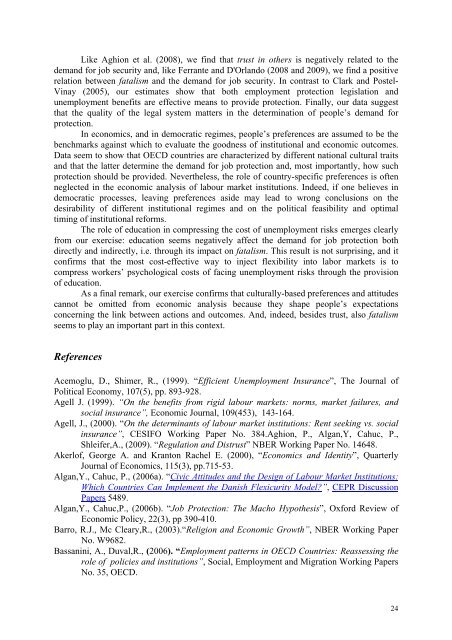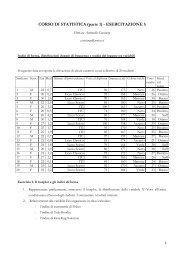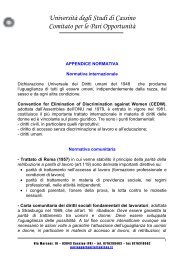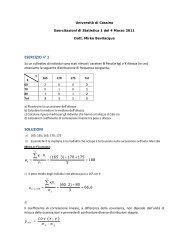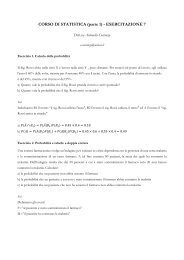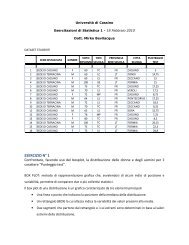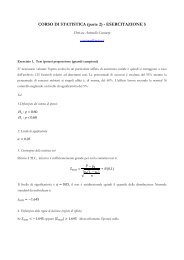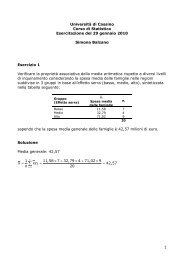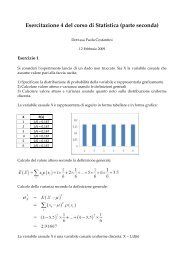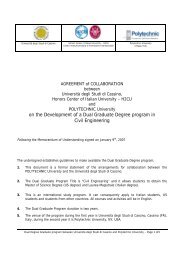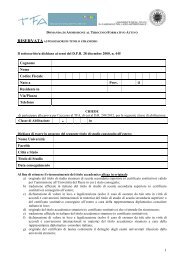Culturally-based beliefs and labour market institutions - dipse ...
Culturally-based beliefs and labour market institutions - dipse ...
Culturally-based beliefs and labour market institutions - dipse ...
Create successful ePaper yourself
Turn your PDF publications into a flip-book with our unique Google optimized e-Paper software.
Like Aghion et al. (2008), we find that trust in others is negatively related to thedem<strong>and</strong> for job security <strong>and</strong>, like Ferrante <strong>and</strong> D'Orl<strong>and</strong>o (2008 <strong>and</strong> 2009), we find a positiverelation between fatalism <strong>and</strong> the dem<strong>and</strong> for job security. In contrast to Clark <strong>and</strong> Postel-Vinay (2005), our estimates show that both employment protection legislation <strong>and</strong>unemployment benefits are effective means to provide protection. Finally, our data suggestthat the quality of the legal system matters in the determination of people’s dem<strong>and</strong> forprotection.In economics, <strong>and</strong> in democratic regimes, people’s preferences are assumed to be thebenchmarks against which to evaluate the goodness of institutional <strong>and</strong> economic outcomes.Data seem to show that OECD countries are characterized by different national cultural traits<strong>and</strong> that the latter determine the dem<strong>and</strong> for job protection <strong>and</strong>, most importantly, how suchprotection should be provided. Nevertheless, the role of country-specific preferences is oftenneglected in the economic analysis of <strong>labour</strong> <strong>market</strong> <strong>institutions</strong>. Indeed, if one believes indemocratic processes, leaving preferences aside may lead to wrong conclusions on thedesirability of different institutional regimes <strong>and</strong> on the political feasibility <strong>and</strong> optimaltiming of institutional reforms.The role of education in compressing the cost of unemployment risks emerges clearlyfrom our exercise: education seems negatively affect the dem<strong>and</strong> for job protection bothdirectly <strong>and</strong> indirectly, i.e. through its impact on fatalism. This result is not surprising, <strong>and</strong> itconfirms that the most cost-effective way to inject flexibility into labor <strong>market</strong>s is tocompress workers’ psychological costs of facing unemployment risks through the provisionof education.As a final remark, our exercise confirms that culturally-<strong>based</strong> preferences <strong>and</strong> attitudescannot be omitted from economic analysis because they shape people’s expectationsconcerning the link between actions <strong>and</strong> outcomes. And, indeed, besides trust, also fatalismseems to play an important part in this context.ReferencesAcemoglu, D., Shimer, R., (1999). “Efficient Unemployment Insurance”, The Journal ofPolitical Economy, 107(5), pp. 893-928.Agell J. (1999). “On the benefits from rigid <strong>labour</strong> <strong>market</strong>s: norms, <strong>market</strong> failures, <strong>and</strong>social insurance”, Economic Journal, 109(453), 143-164.Agell, J., (2000). “On the determinants of <strong>labour</strong> <strong>market</strong> <strong>institutions</strong>: Rent seeking vs. socialinsurance”, CESIFO Working Paper No. 384.Aghion, P., Algan,Y, Cahuc, P.,Shleifer,A., (2009). “Regulation <strong>and</strong> Distrust” NBER Working Paper No. 14648.Akerlof, George A. <strong>and</strong> Kranton Rachel E. (2000), “Economics <strong>and</strong> Identity”, QuarterlyJournal of Economics, 115(3), pp.715-53.Algan,Y., Cahuc, P., (2006a). “Civic Attitudes <strong>and</strong> the Design of Labour Market Institutions:Which Countries Can Implement the Danish Flexicurity Model?”, CEPR DiscussionPapers 5489.Algan,Y., Cahuc,P., (2006b). “Job Protection: The Macho Hypothesis”, Oxford Review ofEconomic Policy, 22(3), pp 390-410.Barro, R.J., Mc Cleary,R., (2003).“Religion <strong>and</strong> Economic Growth”, NBER Working PaperNo. W9682.Bassanini, A., Duval,R., (2006). “Employment patterns in OECD Countries: Reassessing therole of policies <strong>and</strong> <strong>institutions</strong>”, Social, Employment <strong>and</strong> Migration Working PapersNo. 35, OECD.24


